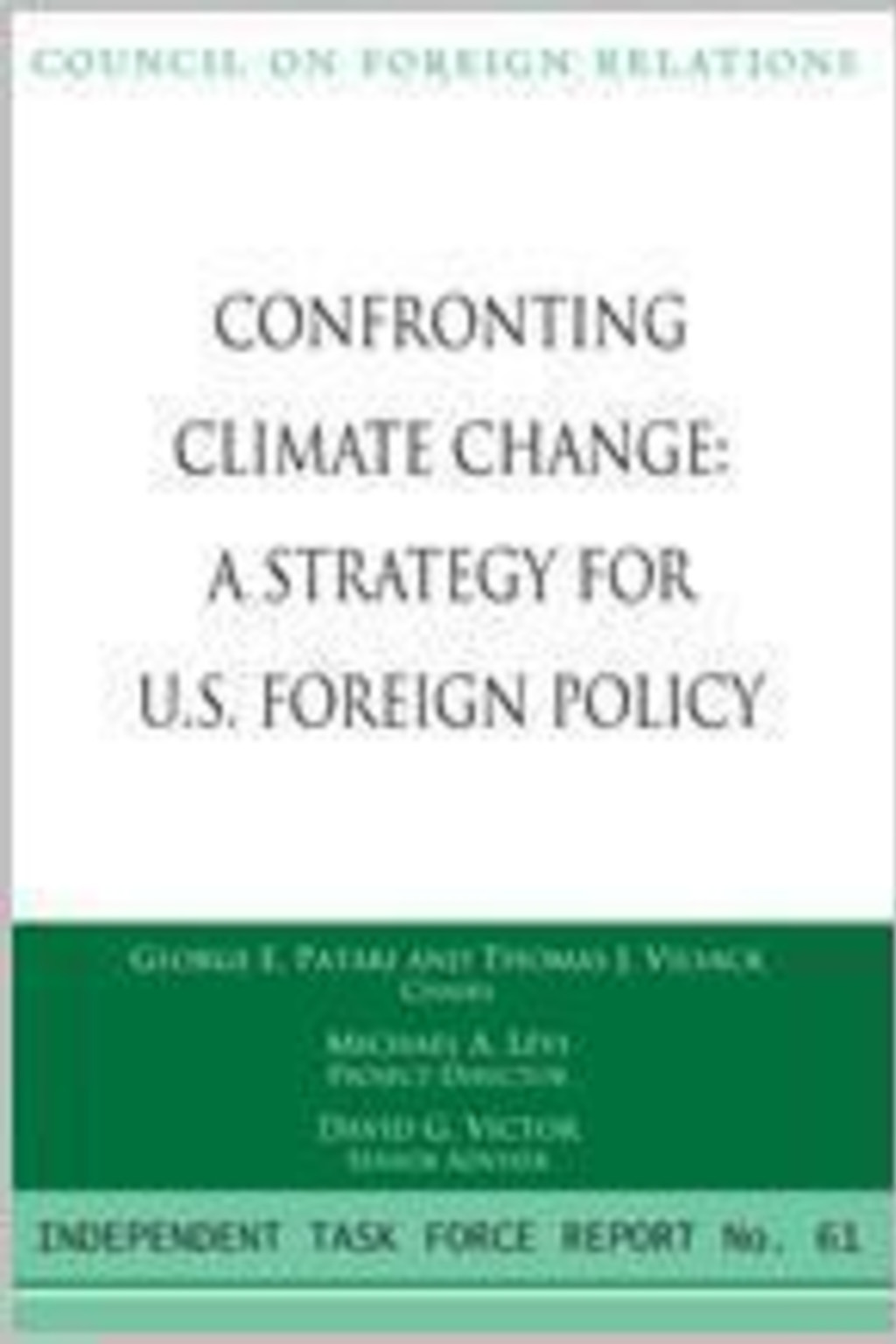Task Force Report No. #66
Confronting Climate Change
A Strategy for U.S. Foreign Policy
- Thomas J. VilsackCochair
- George E. PatakiCochair
- Michael LeviDirector
What are Task Force Reports?
CFR sponsors Task Forces to assess issues of critical importance to U.S. foreign policy to reach bipartisan consensus on policy recommendations.
Who makes them?
Task Force members aim to reach a meaningful consensus on policy and are solely responsible for the content of their report.
Against the backdrop of increasing attention to energy and climate change in the presidential campaigns, recent failure of the Senate to advance the Lieberman-Warner climate bill, and preparations for this summer’s G8 summit, a CFR-sponsored Independent Task Force recommends an overhaul of U.S. domestic and foreign policy to confront the challenge.
Chaired by former New York governor George E. Pataki and former Iowa governor Thomas J. Vilsack, the Task Force says that the United States must leverage ambitious, comprehensive, and equitable action at home to advance an effective policy abroad. It lays out a U.S. negotiating strategy for a global climate accord, outlining what the United States should be willing to offer and what it should expect others, including the rapidly emerging economies, to do in return.
The Task Force cautions, however, that a comprehensive post-Kyoto climate deal will not be easy to conclude, noting: “Even as the United States pursues ambitious and mandatory policies at home, it should not sign on to an emissions cap as part of any global deal that does not include strong commitments to actions from the major emerging economies.”
Even with an agreement, the Task Force concludes that “ensuring that the biggest emitters meet their commitments would still be a monumental task.” It thus recommends creating a Partnership for Climate Cooperation that would focus the world’s largest emitters, including India and China, on implementing aggressive emissions reductions. The partnership would complement efforts in the United Nations to get a global treaty.
The Task Force urges policymakers to not ignore the important economic challenges involved in reducing emissions, noting that near-term costs “matter because they affect the livelihood of Americans.” It argues, though, that a “properly designed and executed domestic policy ... can avoid unacceptable shocks or disruptions and smooth the transition to a low-carbon economy.” It also says that climate policy “presents opportunities to strengthen important parts of the economy and create jobs, to rebuild U.S. partnerships and alliances, and to bolster energy security.”
The Task Force, Confronting Climate Change: A Strategy for U.S. Foreign Policy, is directed by David M. Rubenstein Senior Fellow for Energy and Environment Michael A. Levi and advised by Adjunct Senior Fellow David G. Victor. It comprises a coalition of twenty-nine prominent individuals from business, the environmental community, industry, labor, and academia and includes prominent officials from the Bush and Clinton administrations who have long been on opposing sides of the climate change debate.
Task Force Members
Timothy D. Adams is managing director of the Lindsey Group. Previously, Mr. Adams served as undersecretary of treasury for international affairs. As undersecretary, Mr. Adams was the administration’s point person on international financial issues, including exchange rate policy, G7 meetings, and IMF and World Bank issues. He regularly interacted with counterparts in key emerging markets including China, India, and Brazil and traveled extensively throughout Asia, the Middle East, and Europe. Mr. Adams has also served as chief of staff to both Treasury Secretary Paul O’Neill and Treasury Secretary John W. Snow. He was policy director for the Bush-Cheney reelection campaign from November 2003 to November 2004 and served in the White House under the first President Bush at the Office of Policy Development.
Sally M. Benson is executive director of Global Climate and Energy Project (GCEP). Dr. Benson is responsible for guiding the development of GCEP’s diverse research portfolio in low-emission energy-supply technologies. A professor in the Department of Energy Resources Engineering at Stanford University’s School of Earth Sciences, she has been a member of Stanford’s faculty since 2007. Prior to joining GCEP, Dr. Benson worked in a number of capacities at Lawrence Berkeley National Laboratory, including earth sciences division director, associate laboratory director for energy sciences, and deputy director of operations.
Aimée R. Christensen leads Christensen Global Strategies, advising clients seeking to address the global challenges of climate change, ecosystem degradation, and resource scarcity. Ms. Christensen previously developed climate change strategy for Google.org and worked with the legal department of the World Bank, Environment2004, Baker & McKenzie, the International Centre for Trade and Sustainable Development, and the U.S. Department of Energy, where she developed the first bilateral agreements on climate change. She is a member of the advisory boards of EKO Asset Management Partners, the Sustainable Endowments Institute, Vote Solar, and theYaleCenterfor Environmental Law and Policy, and is on the board of directors of the American Council on Renewable Energy, ecoAmerica, and the National Association of Environmental Law Societies.
Stuart E. Eizenstat heads the international practice at Covington & Burling LLP and testifies frequently before Congress on climate change issues. From 1993 to 2001, he was U.S. ambassador to the European Union, undersecretary of commerce, undersecretary of state, and deputy secretary of the treasury. He led the U.S. government delegation in negotiating the Kyoto Protocol on Climate Change in 1997, and was the Clintonadministration’s chief negotiator on Holocaust restitution issues. He was President Jimmy Carter’s chief domestic policy adviser and executive director of the White House domestic policy staff (1977–81).
Thomas F. Farrell II is chairman, president, and chief executive officer of Dominion, one of the nation’s largest producers of energy. Mr. Farrell earned both his bachelor’s degree in economics and his law degree from the University of Virginia. He is a member of the board of directors of Dominion Resources Inc. and Altria Inc. Mr. Farrell also is a member of the board of visitors and has served as rector of theUniversity of Virginia. Other board memberships include the Colonial Williamsburg Foundation, the Institute of Nuclear Power Operations, and Edison Electric Institute.
Sherri W. Goodman is general counsel at the CNA Corporation, a nonprofit analysis and solutions organization for the Department of Defense and other public sector leaders. Ms. Goodman has led CNA’s project on national security and climate change, whose report, National Security and the Threat of Climate Change, was released in April 2007. She served as deputy undersecretary of defense (environmental security)from 1993 to 2001, where she was responsible for defense policies on climate change. Ms. Goodman has served on the staff of the Senate Armed Services Committee for Chairman Senator Sam Nunn and practiced law at Goodwin Procter. She is on the boards of the Atlantic Council, Woods Hole Oceanographic Institution, and the National Academy of Sciences Board on Environmental Studies and Toxicology.
Shirley Ann Jackson is president of Rensselaer Polytechnic Institute. Dr. Jackson has held senior leadership and advisory positions in government, industry, research, and academia, with a particular focus on global energy security and the national capacity for innovation. A theoretical physicist, she was chairman of the U.S. Nuclear Regulatory Commission from 1995 to 1999. She is a member of the National Academy of Engineering and the American Philosophical Society, and is a fellow of the American Academy of Arts and Sciences, the American Physical Society, and the American Association for the Advancement of Science (AAAS). She is a vice chairman of the Council on Competitiveness and co-chair of its energy security, innovation, and sustainability initiative, and was formerly president (2004) and chairman of the board (2005) of the AAAS. She is a regent of the Smithsonian Institution, on the board of NYSE Euronext, and a director of IBM, FedEx, Marathon Oil, Medtronic, and PSEG.
Robert W. Lane has served as chairman and CEO of Deere & Company since August 2000. Deere & Company is the world’s leading provider of advanced products and services for agriculture and forestry equipment, and a major provider of advanced products and services for construction, lawn and turf care, landscaping and irrigation. John Deere also manufactures and markets engines used in heavy equipment and provides worldwide financial services. Mr. Lane earlier led the Worldwide Agricultural Equipment Division, and served as the company’s chief financial officer. He also served as president of Deere Credit, Inc., and directed equipment operations around the world. Mr. Lane is a director of General Electric Company and Verizon Communications Inc. He is an honorary director of the Lincoln Park Zoo and a national director of the Lyric Opera of Chicago. He graduated with high honors from Wheaton College and earned an MBA from the University of Chicago Graduate School of Business.
Jonathan Lash has served as president of the World Resources Institute since 1993. A former co-chair of President Clinton’s Council on Sustainable Development, secretary of natural resources for the State of Vermont, Peace Corps volunteer, federal prosecutor, and law professor, Mr. Lash serves on the advisory board of Generation Investment Management, the board of directors of the Avina Foundation, and the advisory council of Viva Trust.
Michael A. Levi is the David M. Rubenstein senior fellow for energy and environment at the Council on Foreign Relations and director of its program on energy security and climate change. He was previously science and technology fellow in foreign policy studies at the Brookings Institution. Dr. Levi, whose research focuses on the intersection of science, technology, and foreign policy, is the author of two books, most recently On Nuclear Terrorism (Harvard, 2007). He holds an MA in physics from Princeton University and a PhD in war studies from the University of London (King’s College).
Robert A. Malone is chairman and president of BP America Inc. Mr. Malone is BP’s chief representative in the United States. He has served on the California Climate Action Registry board of directors and was a member of the board of regents for the University of Alaska system. Mr. Malone has been selected for the board of trustees of the National Urban League, the Foreign Policy Association, and the Board of the National Petroleum Council. In addition, he is currently on the executive committee for the American Petroleum Institute (API), a director of the Greater Houston Partnership, and a member of the Business Roundtable. Mr. Malone is also a trustee on the board for the Museum of Science and Industry in Chicago.
Jessica T. Mathews was appointed president of the Carnegie Endowment for International Peace in 1997. A former senior fellow at the Council on Foreign Relations and director of the Council’s Washington Program, Ms. Mathews was founding vice president and director of research at the World Resources Institute, a center for policy research on environmental and natural-resource management issues. She has also served on the editorial board of the Washington Post, covering energy, environment, science, technology, arms control, health, and other issues, and later became a weekly columnist for the Post and International Herald Tribune. Ms. Mathews has served in government as director of the Office of Global Issues of the National Security Council, covering nuclear proliferation, conventional arms sales, chemical and biological warfare, and human rights; and as deputy to the undersecretary of state for global affairs. She is a trustee of the Rockefeller Foundation, the Century Foundation, the Nuclear Threat Initiative, and the International Crisis Group.
Ken B. Mehlman is managing director and head of global public affairs at Kohlberg Kravis Roberts & Co (KKR). Before joining KKR, Mr. Mehlman was a partner at Akin Gump Strauss Hauer & Feld, where he helped businesses and individuals manage risk and seize opportunities at the nexus of business and public policy. At Akin Gump, he was co-chairman of the climate change practice. Mr. Mehlman served as chairman of the Republican National Committee and campaign manager for President George W. Bush’s 2004 reelection campaign. He also served in high level positions in Congress and the White House, including as White House political director during President Bush’s first term.
Stephen W. Pacala currently holds the Frederick D. Petrie chair in the Department of Ecology and Evolutionary Biology and is director of the Princeton Environmental Institute. Dr. Pacala’s research focuses on forests and the global carbon cycle. He also directs, with Robert Socolow, Princeton’s Carbon Mitigation Initiative, which is aimed at finding solutions to the greenhouse warming problem. Dr. Pacala has received numerous honors and awards, including election to the National Academy of Sciences in 2007.
George E. Pataki is counsel of Chadbourne & Parke LLP, focusing on their environmental energy and corporate practice areas. Governor Pataki is also the founder and chairman of the Pataki-Cahill Group, a consulting firm concentrating on climate change, energy, and the environment. He was previously governor of New York (1995–2006), during which time he led the establishment of the first mandatory cap-and-trade carbon initiative (Regional Greenhouse Gas Initiative). Governor Pataki also implemented the first integrated strategy for creating clean, renewable transportation networks, worked to create public-private partnerships for clean energy generation in New York State, and instituted the nation’s first green building tax-credit incentive program.
William A. Pizer is a senior fellow and research director at Resources for the Future, where his research looks at how the design of environmental policy affects costs and environmental effectiveness, often related to global climate change. Dr. Pizer was a lead author on the Intergovernmental Panel on Climate Change 4th Assessment Report, chaired the U.S. Department of Energy (DOE) review of its Integrated Assessment Research Program, and serves on both the U.S. Environmental Protection Agency Environmental Economics Advisory Committee and the DOE Climate Change Science Program Product Development Advisory Committee. During 2001–2002, he served as a senior economist at the President’s Council of Economic Advisers, where he worked on environment and climate change issues.
William K. Reilly is a founding partner of Aqua International Partners, LP, a private equity fund dedicated to investing in companies engaged in water and renewable energy, and a senior adviser to TPG Capital, LP. Mr. Reilly served as administrator of the U.S. Environmental Protection Agency, president of the World Wildlife Fund, and president of the Conservation Foundation. He was head of the U.S.delegation to the United Nations Earth Summit at Rioin 1992. Mr. Reilly is chairman emeritus of the board of the World Wildlife Fund, co-chair of the National Commission on Energy Policy, chair of the advisory board for the Nicholas Institute for Environmental Policy Solutions at DukeUniversity, chair of the board for the Global Water Challenge, and a director of the Packard Foundation and the National Geographic Society. He also serves on the board of directors of DuPont, ConocoPhillips, and Royal Caribbean International.
Theodore Roosevelt IV is managing director at Lehman Brothers and a member of the firm’s senior client coverage group, which oversees the firm’s client and customer relationships. He joined Lehman in 1972 as a general banker in domestic corporate finance. Mr. Roosevelt is chairman of Lehman Brothers‘ Council on Climate Change. He is chair of the Pew Center for Global Climate Change, a member of the Governing Council of the Wilderness Society, and a trustee of the Alliance for Climate Protection, the American Museum of Natural History, the World Resources Institute, the Cultural Institutions Retirement System, and Trout Unlimited. He is also a counselor of the China-U.S. Center for Sustainable Development, and served as both a board member and the chair of the League of Conservation Voters.
Stephen M. Ross is chairman, chief executive officer, and founder of Related Companies, an international real estate development company formed in 1972. Mr. Ross is chairman of the Real Estate Board of New York and chairman of the board of directors of both Centerline, the country’s largest financier of affordable housing, and Equinox Fitness Clubs, one of Related’s most recent acquisitions.
David M. Rubenstein is a cofounder and managing director of the Carlyle Group. Mr. Rubenstein is on the board of directors or trustees of Duke University, Johns Hopkins University, University of Chicago, the Lincoln Center for the Performing Arts (Vice Chairman), the Kennedy Center for the Performing Arts, the Memorial Sloan-Kettering Cancer Center, Johns Hopkins Medicine, the Council on Foreign Relations, the Institute for Advanced Study, the Cold Spring Harbor Laboratory, the National Museum of American History of the Smithsonian Institution, the Museum of Natural History of the Smithsonian Institution, the Center for Strategic and International Studies, the Asia Society, the American Academy in Berlin, the American Council on Germany, Freedom House, and Ford’s Theatre. From 1977 to 1981, during the Carter administration, Mr. Rubenstein was deputy assistant to the president for domestic policy.
David Sandalow is energy and environment scholar and a senior fellow at the Brookings Institution. Mr. Sandalow is chair of the energy and climate working group of the Clinton Global Initiative and a senior adviser to Good Energies, Inc. He has served as assistant secretary of state for oceans, environment, and science; senior director for environmental affairs, National Security Council; associate director for the global environment, White House Council on Environmental Quality; and executive vice president of the World Wildlife Fund-U.S. Mr. Sandalow has been a Stimson fellow at Yale University; member of the Sustainable Development Roundtable at the OECD; member of the American Bar Association (ABA) Standing Committee on Environmental Law; and co-chair of the ABA’s annual conference on environmental law.
Lawrence R. Scanlon started his career in the union in 1974 as a field representative for the 250,000-member New York Civil Service Employees Association, AFSCME Local 1000. He held a series of positions with the union culminating in his appointment as executive director in 1992. In 1995, President Gerald W. McEntee appointed Mr. Scanlon to direct AFSCME’s political department. Responsibilities for the 1.3 million-member union include the development and implementation of the union’s political strategy to support candidates and campaigns (federal, state, and local) that will positively impact on public policy and union member concerns.
Lawrence H. Summers is the Charles W. Eliot university professor at Harvard University. He served as twenty-seventh president of Harvard University from July 2001 until June 2006. An eminent scholar and admired public servant, Mr. Summers has taught on the faculty at Harvard and MIT. He has served in a series of senior public policy positions, including political economist for the President’s Council of Economic Advisers, chief economist of the World Bank, and secretary of the treasury of the United States. In 1993 he received the John Bates Clark Medal, given every two years to the outstanding American economist under the age of forty. Mr. Summers received his BS from MIT and his PhD in economics from Harvard.
Mark R. Tercek is a managing director of Goldman Sachs and heads the firm’s environmental strategy group and its Center for Environmental Markets. Mr. Tercek joined Goldman Sachs in 1984 and was named a partner in 1996. In previous positions he headed the firm’s equity capital markets, corporate finance, real estate, and consumer/healthcare departments. In an earlier assignment, Mr. Tercek coheaded the firm’s corporate finance business in Tokyo. He is an adjunct professor at New York University’s Stern School of Business with appointments in both the finance and management and organization departments. Mr. Tercek serves on the board of trustees of Resources for the Future, Business for Social Responsibility, Seachange Capital, and Western Reserve Academy. He is also a member of the steering group on the Prince’s Rainforest Project.
David G. Victor is professor of law at Stanford University Law School, where he teaches energy law, regulation, and political economy. Dr. Victor is also director of the program on energy and sustainable development at Stanford University’s Freeman Spogli Institute for International Studies, which focuses on power sector reform, the emerging global market for natural gas, energy services for the world’s poor, the practical challenges in managing climate change, and the role of state-controlled oil and gas companies in the world’s hydrocarbon markets. Much of the program’s research concentrates in Brazil, China, India, Mexico, and South Africa. Previously, he directed the science and technology program at the Council on Foreign Relations, where he remains adjunct senior fellow. Dr. Victor directed the Council’s Task Force on Energy and U.S. Foreign Policy chaired by John Deutch and James R. Schlesinger. He also leads a study group that is examining ways to improve management of the nation’s $50 billion strategic oil reserve.
Thomas J. Vilsack is of counsel in the Dorsey trial group at Dorsey & Whitney LLP. Governor Vilsack’s practice focuses on strategic counseling and advising clients in the fields of energy conservation, renewable energy, and agribusiness development. He previously was governor of Iowa (1998–2006), during which time he focused on improving education, particularly in early childhood, expanding health care to the uninsured, and making the state a national leader in renewable energy. Governor Vilsack served as an Iowa State senator and mayor of Mt. Pleasant, Iowa. He is also a highly regarded litigator, with more than twenty-five years of trial experience handling complex litigation and class actions with state-wide and national implications.
Timothy E. Wirth is the president of the United Nations Foundation and the Better World Fund. As president of the UN Foundation (UNF ) since its inception in early 1998, Wirth has organized and led the formulation of the Foundation’s mission and program priorities, which include the environment, women and population, children’s health, and peace, security and human rights. Senator Wirth served in the U.S. House of Representatives from 1975 to 1987 and in the Senate from 1987 to 1993. Following these two decades of elected politics, Wirth was national co-chair of the Clinton-Gore campaign, and served in the U.S. Department of State as the first undersecretary for global affairs from 1993 to 1997. He chaired the U.S. delegation at the 1994 Cairo Conference on Population and Development and was the lead U.S. negotiator for the Kyoto Climate Conference until late 1997. He was recently honored as a Champion of the Earth by the United Nations Environment Programme.
James D. Wolfensohn is chairman of Wolfensohn & Company, LLC, a private investment firm, and an adviser to corporations and governments. Mr. Wolfensohn become chairman of Citi International Advisory Board; he is also adviser to Citi’s senior management on global strategy and on international matters. Mr. Wolfensohn was the ninth president of the World Bank Group, from 1995 to 2005, during which time he led successful initiatives on debt reduction, environmental sustainability, anticorruption programs, and AIDS prevention and treatment. He is also chairman of the advisory group of the Wolfensohn Center, a new research initiative focused on global poverty, at the Brookings Institution.
Philip D. Zelikow is White Burkett Miller professor of history at the University of Virginia. A former career diplomat, he has continued to serve occasionally in government, most recently as the executive director of the 9/11 Commission and as counselor of the Department of State. He is a member of the advisory panel on global development for the Bill and Melinda Gates Foundation.






